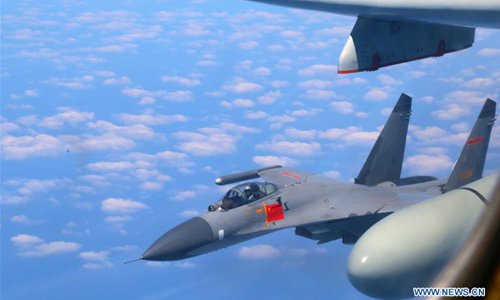Reported US drone sale to Taiwan a political stunt: experts
By Huang Lanlan and Du Qiongfang Source: Global Times Published: 2020/8/7 20:43:41

A Chinese People's Liberation Army (PLA) air force formation conducts island patrols during training on April 26, 2018. The formation was made up of fighters, early warning and surveillance aircraft, and H-6K bombers, which took off from various military airfields. The formation flew over the Miyako Strait and Bashi Channel, completing an island patrol, the subject of the training. (Xinhua/Yuan Jun)
China on Friday sharply criticized a reported plan by the US to sell military drones to the island of Taiwan, saying that the move seriously undermines China's sovereignty and security interests. Mainland experts noted that the potential sale is more of a political stun that has little military value.
The US was considering selling the island at least four SeaGuardian surveillance drones, which have a range of 6,000 nautical miles (11,100 kilometers), much higher than the 160-mile range of the island's current fleet of drones, Reuters reported on Thursday.
The approximately $600 million deal still requires approval from US Congress, but the US Department of State has "tacitly authorized the sale of the unmanned aerial vehicles," according to Reuters. If completed, the deal would be the US' first sale of "sophisticated" drones to Taiwan, the report noted.
In Beijing, the Chinese Foreign Ministry on Friday harshly criticized the plan, calling the move a serious violation of the one-China principle and the three China-US joint communiques, particularly the China-US Joint Communique on arms sales to Taiwan signed on August 17, 1982, stipulating that Washington must gradually reduce its arms sales to the island.
"This move has severely undermined China's sovereignty and security interests, and has seriously violated the basic norms of international relations," Wang Wenbin, a spokesperson for the ministry, told a routine news briefing.
Wang added that "the Taiwan question bears on China's sovereignty and territorial integrity" and urged the US to "stop arms sales to and military ties with Taiwan, so as to avoid causing serious damage to China-US relations and stability across the Taiwan Straits."
Despite the political seriousness of the potential sale, the MQ-9B SeaGuardian surveillance drone would play a very limited role for the Taiwan separatist authority as it wouldn't match the island's geographical position, said Beijing-based naval expert Li Jie.
The wide range of the drone originally designed for the US military may not work well in the Taiwan Straits, where the Chinese mainland's People's Liberation Army (PLA) holds air superiority, Li told the Global Times on Friday. "The PLA can defend [against any action] with its advanced drone technologies, many of which have surpassed those of the US," he said.
The deal has caused uproar among netizens on the island, with some Facebook users referring to the Tsai Ing-wen authority as an ATM machine that continuously hands out money to the US.
US Congress will likely approve the deal, which allows the Trump administration to play its "Taiwan card" to provoke the mainland, Li predicted. "Trump's failures in fighting COVID-19 and saving the US economy have forced him to take a tougher attitude toward the Chinese mainland for re-election votes," he noted.
It is not yet known whether the US intends to sell unarmed SeaGuardian drones to Taiwan as surveillance aircraft or if a sale would involve weapon-equipped drones, said Zhang Junshe, a senior research fellow at the PLA Naval Military Studies Research Institute.
"In any case, it is laughably presumptuous that the separatist Taiwan authority intends to battle against the mainland by buying a few weapons," Zhang told the Global Times, saying US weapon sales could intoxicate the island's separatists but would have little actual military effect.
The Trump administration last month loosened restrictions on exports of military-grade aerial drones that fly at a speed below 800 kilometers per hour, once categorized as lethal "category-1" weapons alongside smaller cruise missiles. The administration announced in May that it would sell 18 heavyweight torpedoes to Taiwan.
Chinese State Councilor and Minister of National Defense Wei Fenghe on Thursday stated China's principled position on the Taiwan question in a phone call with US Secretary of Defense Mark Esper.
In the rare phone conversation, Wei urged the US to improve the management and control of maritime risks and avoid taking dangerous moves that may escalate the situation.
Still, the phone call between the top defense officials itself sent a positive signal that shows their willingness to communicate and that neither side would like to see military conflicts or armed confrontations, an anonymous military expert told the Global Times on Friday.
The US' plan to sell drones to the Taiwan region, however, has deviated from the effort to maintain communication, and could strain relations between the two militaries, observers said.
RELATED ARTICLES:
Posted in: HK/MACAO/TAIWAN